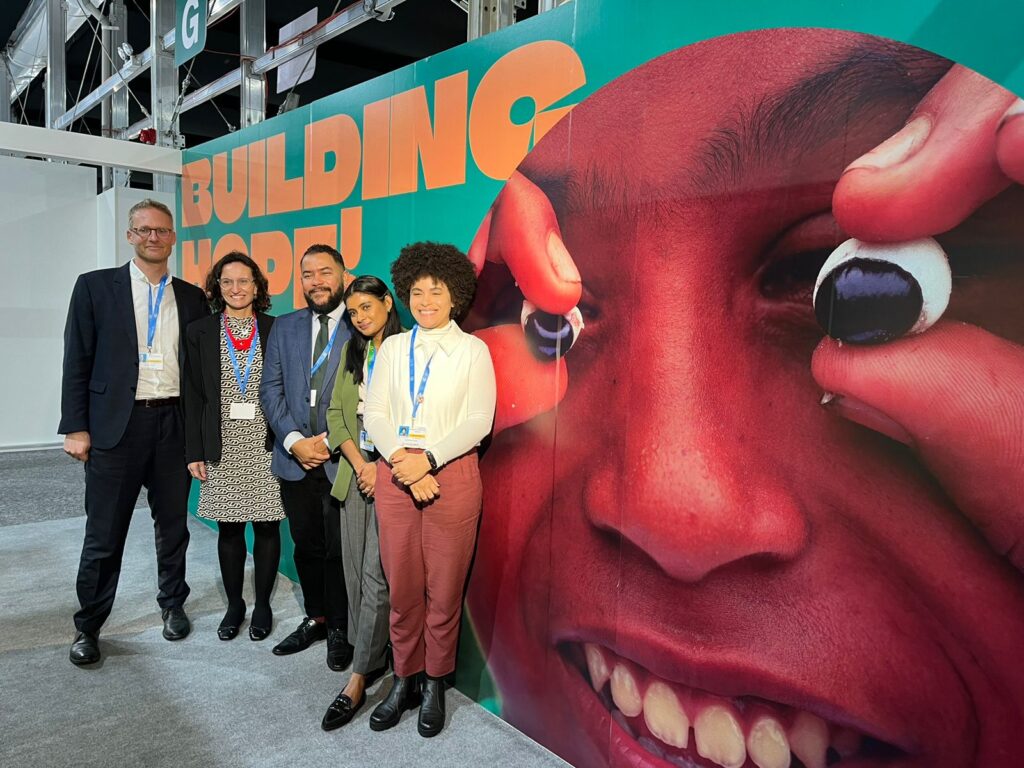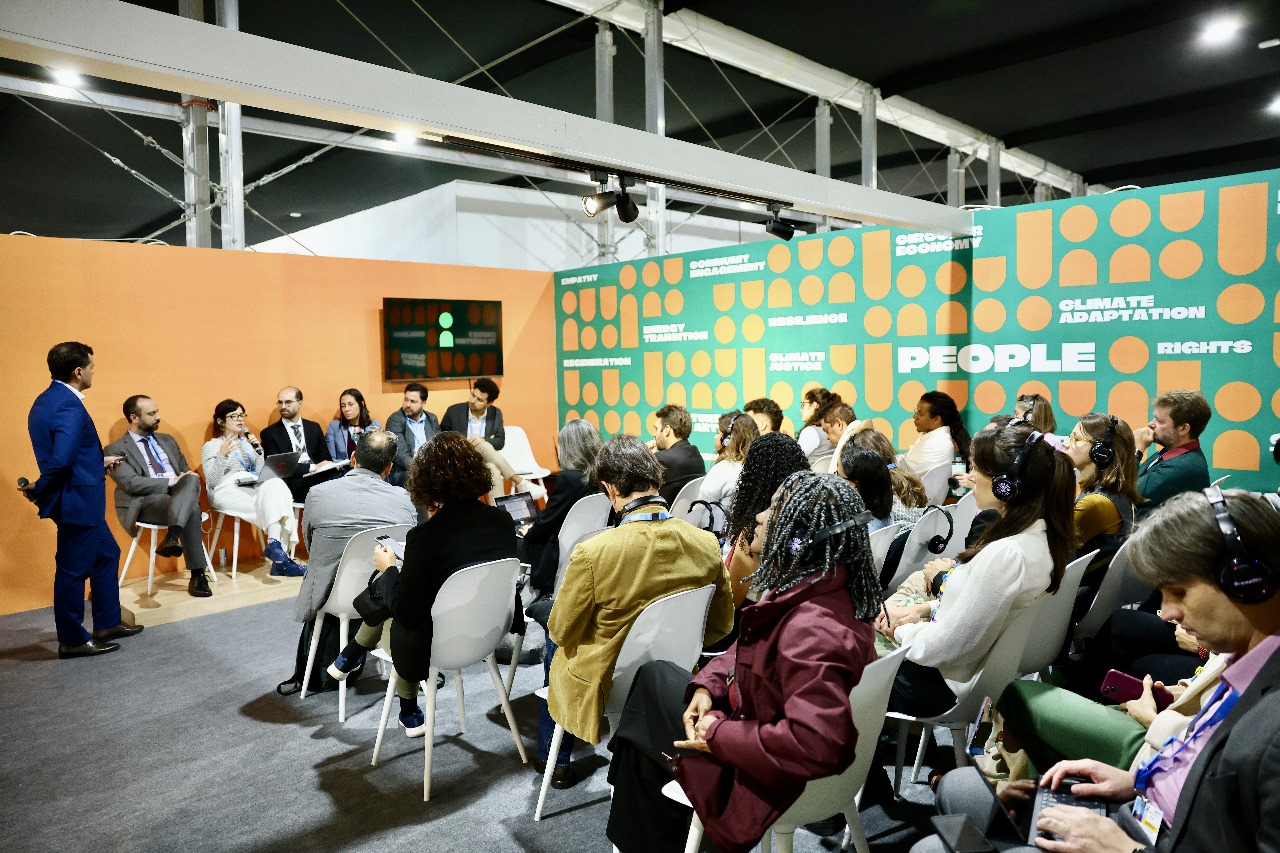On the day that the COP30 held the first negotiation round on the technology implementation programme — that addresses needs of developing countries on technology development and transfer — the Regional Climate Foundations pavilion debated how artificial intelligence and big data can help the fighting against climate change.
“Technology is one of the pillars of the climate change regime, but has being a neglected topic for many years”, introduced Pedro Ivo Ferraz, a diplomat from the Brazilian Ministry of International Affairs. According to him, the technology chapter was set up late, compared to the other aspects of the climate agreements. “And it is significantly underfunded”, completed.
However, in Baku there are expectations to start making progress on funding technology for developing countries. “There are high hopes in Baku about getting some achievement. But if we can’t, I’m sure it will happen in Belém”, concluded, referring the COP30 in Brazil, next year.
Brazil is one of the countries that can improve its climate policies using technology, big data analysis and artificial intelligence. For example, to check if a supply chain is contributing to deforestation or if the controls are working. There is plenty of public data, but lack of capacity to analyse this information on a massive scale. “The main challenge is to integrate the databases. We have information on the environmental compliance of each property and on the social use of the land. We also know who owns these areas and which ones are or not complying with the forestry code”, said Adauto Modesto Junior, from the Brazilian Ministry of Management and Innovation in Public Services.
Maria Netto, the executive director of Instituto Clima e Sociedade remembered that this problem gets worse when the focus passed from the national government to the subnational level. “It is a big challenge looking at this first layer, but if we go below, there are many local systems managing data”, she said, suggesting that this information already available, but not connected could help handle difficulties as hot waves, fires, and floods.
One good example on how the technology can transform the reaction to climate extreme events came from Google, that was represented in the debate by its public policy manager, Juliana Moura. According to Moura, Google developed a system that sent hundreds of alerts predicting the floods in Rio Grande do Sul when the state was hit by heavy rains, in May. The events caused intense flooding, forced displacement, economic losses and deaths: “We have many projects that are helping the government construct data infrastructure and analysing data with machine learning to predict climate effects”.
Cop30 in Brazil wants to improve popular participation
Brazil was in the spotlight of the first day of activities in the Regional Climate Foundation pavilion at COP29, in Baku, Azerbaijan. The country will host the next UN Climate Change Conference, in Belém, which expanded the attention that usually receives as home of the biggest tropical forest in the world, the Amazon.
The initial debate on the Regional Climate Foundations Pavilion in 2024 presented the Citizen’s Assembly that will have place at COP30, a tool that can serve both to amplify the representativeness in the event, but also to strength the sense of democracy in the country. “We need is to build a truly civic infrastructure for participation and to promote a dialogue since the day 1 to the last day”, said Leonildes Nazar, from Instituto Clima e Sociedade.

According to Diego Casaes, from Climate Emergency Collaboration Group, the process involved in the negotiations is limited: “What happened in the pavilions and meeting rooms is many times disconnected from the community level”. “With a Citizens Assembly we can shake up the system a little bit, ensuring that different perspectives will be considered, changing the system from the outside”, completed.
The initiative is from Iswe Foundation, that is in conversation with the Brazilian government. “We are very happy to see this is happening. We welcome everybody to come and suggest other instruments like that”, confirmed Alice Amorim, from the Brazilian government.
COP30 is also considered an opportunity to enlarge financial resources available to climate and nature conservation projects. “Brazil has a unique opportunity to lead by example and become a developed green economy, with a window that opened at the Amazon Summit, advances with the G20 presidency, and will culminate at COP 30 in Belém. The mobilization of finance for climate and nature is urgent”, introduced Giovanna Kuele, who is a program manager for international cooperation at Igarapé Institute.
Brazil was also the subject of another debate that had private sector participation, including companies that rely on the Amazon production, as Natura and Banco da Amazônia. This panel approached the role of the private sector in the NDCs goals — that are established by the governments, but are getting the attention of companies that are interested in investing in climate resilience. “If we don’t fight the climate change, there will be no competitiveness for any of us”, said Fionna Duggan, Global Sustainability Senior Manager at Unilever.
Energy solutions developed by communities
Not all was about Brazil on this first day of Regional Climate Foundations Pavilion. Representatives for climate foundations in China, Nigeria and Mexico also presented their progresses in the objective of scaling renewable energy solutions for communities. “These experiences have multiple benefits: they reduce emissions, as we are investing in solar panels to generate energy in small communities. And will contribute directly to increasing the living standards for the population, by allowing them to sell the energy surplus”, said professor Zou Ji, from Energy Foundation China, which leads energy transition projects in the country.

